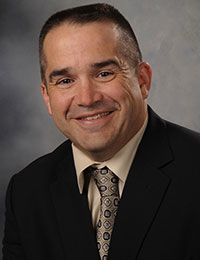Extension agents adapting well, continue serving Kansans, director says
Digital learning replaces face-to-face contacts…for now
April 2, 2020
MANHATTAN, Kan. – The leader of the Kansas cooperative extension service, the major outreach arm of Kansas State University to the state’s residents, says that agents across the state are adapting to stay-at-home orders in creative ways to continue helping folks in their communities.
Director for Extension Gregg Hadley noted that the threat of COVID-19 and health officials’ recommendations for people to “socially distance” themselves has changed traditional ways of delivering extension services.
“We are a cooperative extension system that is very used to, very good at – and prefer – face-to-face contact with the people we serve,” said Hadley, speaking on the April 1 broadcast of the Agriculture Today radio program.
“But under the COVID-19 threat, we just had to realize that we were not going to be able to do the face-to-face interactions, and that caused a whole host of challenges. For example, during these early spring months, a lot of times you have tagging and weigh-in of animals for 4-H, spring extension programs, project days, and those sort of things.
“We had to really think about how are we going to do these things and move forward and still provide all of the great information that the university has to the people of Kansas in different ways.”
Listen to Gregg Hadley on Agriculture Today
What has emerged in a matter of a few weeks, Hadley said, is a system that is using technology to deliver many of the same programs in imaginative ways.
“Just the other day, we had a very experienced agent, long-time educator in the southeast who did a burn workshop using Facebook Live,” Hadley said. “Prior to this, I don’t know that this agent would have considered that, because he is a face-to-face individual and has always worked that way. But in their heart of hearts, extension professionals are going to do whatever they have to do to serve the public.”
Hadley also noted “an excellent video” from the Post Rock extension district – which serves Lincoln, Mitchell, Jewell, Osborne and Smith counties – “of how to go to the grocery store and buy nutritious foods in realistic quantities, while keeping safe and preserving the safety of others.”
“A lot of activities like that are going on right now,” Hadley said.
Local K-State Research and Extension offices in some Kansas counties may still be open, likely with limited staffing. However, staff members in the state’s 105 counties are working and can be contacted by email or phone, according to Hadley. An interactive map of local extension offices, with contact information for each, is available online.
“If anybody needs service from their local extension office, they should still contact the office or use their personal contacts with their local extension agent,” he said.
Hadley has been taking questions about county fairs, a favorite summer activity in many Kansas towns. K-State Research and Extension does not govern county fairs – that is done by each local fair board which will decide whether its fair will be held this year.
“What I have been trying to tell (K-State Research and Extension employees) who are actively involved in their fairs is that we should first hope that the fairs go on as normal and everything is OK,” Hadley said.
“But we need to be thinking of backup activities. For example, if the fair does not go on, could we perhaps have a virtual fair where the 4-Hers can still exhibit their projects on a website or (other platform) and still give that 4-Her a capstone event to look forward to this summer?”
Hadley said he thinks the current crisis may help to improve the ways in which K-State Research and Extension delivers information.
“As with any crisis, you look for the opportunity to improve your service to the people of Kansas,” he said. “We may see once this is all over, some activities go back to face-to-face contact, and that will work really well. And there will be other things that we say, ‘hey this worked really well with technology, so why don’t we continue to keep doing this?’”
Hadley’s full interview on Agriculture Today is available online.


